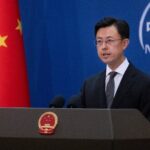Introduction: A Nation on Edge, A Parliament in Action
The Monsoon Session of India’s Parliament is always marked by thunderous debates and legislative reckoning. On Day 8 of the 2025 Monsoon Session, the political heat reached a crescendo as two sensitive and highly emotional issues unfolded side by side—India’s military operation, Operation Sindoor, and the controversial arrest of two Catholic nuns in Chhattisgarh.
On one hand, External Affairs Minister Dr. S. Jaishankar refuted explosive claims of U.S. involvement in India’s national security operations. On the other, Congress MP K.C. Venugopal sounded the alarm over what he alleged was state-sponsored persecution of religious minorities.
This article aims to present a well-rounded journalistic analysis of these events, explore the underlying political dynamics, and understand the implications for India’s internal security, diplomatic policy, and democratic values.
Section 1: The Contours of Operation Sindoor – A Strategic Response to Cross-Border Threats
Background: The Need for Operation Sindoor
In early 2025, India initiated a secretive military offensive, code-named Operation Sindoor, in response to a significant spike in cross-border infiltration and drone attacks from Pakistan-occupied territories. Over 900 drones and missiles were neutralized in a single 48-hour window on May 9, 2025, as per official reports.
This operation, said to be India’s largest drone-interception mission to date, was hailed by strategic experts as a show of dominance in modern warfare—a pivot from conventional troop-based responses to tech-enabled aerial defense.
Speculations on U.S. Involvement
Shortly after the operation’s public reveal in July, foreign media and think tanks began speculating about backchannel mediation by former U.S. President Donald Trump, who had previously made controversial offers to mediate on Kashmir.
Allegations emerged claiming that a U.S.-brokered ceasefire had halted Operation Sindoor prematurely. These whispers snowballed into political mudslinging, with opposition parties demanding transparency on India’s foreign communication during wartime.
Section 2: Jaishankar’s Statement – Clarifying India’s Strategic Autonomy
“No Calls, No Mediation, No Trade Linkage”
On Day 8, Dr. S. Jaishankar stood firm in Parliament, categorically stating:
“Between April 22 and June 17, there were no calls between Prime Minister Modi and President Trump. There was no request, advice, or pressure from the United States to cease our operations. There was also no linkage to any trade negotiations.”
His statement was not only a rebuttal to U.S. press speculations, but also a declaration of India’s strategic autonomy—the principle that India acts in its own national interest without foreign influence.
Why the Denial Matters
India has traditionally resisted third-party mediation in the Kashmir issue. Jaishankar’s statement reinforced that stance and subtly reminded global powers of India’s red lines when it comes to sovereignty.
This becomes even more relevant as India’s geopolitical stature rises, with new alliances in the Global South, and defense deals with France, Israel, and Russia that prioritize autonomy over dependency.
Section 3: Inside Parliament – Reaction from Opposition and Allies
Opposition’s Doubts
Congress, TMC, and CPI(M) members questioned why the government delayed disclosure about Operation Sindoor. Some MPs alleged a “selective narrative”, accusing the government of managing optics rather than offering facts.
Senior Congress leader Shashi Tharoor pointed out that while Jaishankar denied mediation, no written communication was presented to validate the claim.
Government Allies Rally Support
The BJP’s allies, including the JD(U) and Shiv Sena (Shinde faction), backed Jaishankar’s statement, reiterating that national security intelligence cannot always be made public. They accused the opposition of undermining morale among the armed forces.
Section 4: Zero Hour Flashpoint – The Arrest of Two Nuns in Chhattisgarh
What Happened in Durg, Chhattisgarh?
On July 24, two Catholic nuns traveling from Kerala to Chhattisgarh were detained at Durg Railway Station by the Railway Protection Force (RPF) after being accused of “human trafficking and religious conversion” involving tribal girls. Local right-wing activists alleged that the nuns were forcibly converting minors under the guise of shelter.
Despite producing valid travel documents and consent forms from the parents of the girls, the nuns were formally arrested and remanded for 7 days.
K.C. Venugopal’s Parliamentary Protest
During Zero Hour, Congress MP Venugopal condemned the arrests, claiming they were politically motivated and rooted in religious discrimination. He said:
“This is a deliberate attempt to intimidate minorities and criminalize missionary work. The Constitution guarantees freedom of religion. We cannot allow vigilante groups to hijack law enforcement.”
Church Response and Civil Society Uproar
The Syro-Malabar Church, Kerala Catholic Bishops Council (KCBC), and human rights organizations strongly condemned the arrests, calling it “mob justice.” The Malankara Orthodox Church issued a statement warning that India’s international image as a secular democracy is at stake.
Section 5: Analysis – Two Narratives, One Parliament
The Intersection of Nationalism and Minorities
The juxtaposition of these two issues—one about asserting national strength and the other about defending minority rights—reveals a deeper ideological conflict within Indian politics.
- Operation Sindoor represents muscular nationalism, a narrative that defines strength through military capability and diplomatic defiance.
- The arrest of the nuns, on the other hand, exposes domestic fault lines—particularly concerns about religious intolerance, anti-conversion laws, and mob justice.
The Political Strategy Behind the Government’s Dual Messaging
The BJP-led NDA government has successfully crafted a narrative where external threats demand national unity, while internal dissent is seen as subversive. By addressing Operation Sindoor with transparency but brushing off the nuns’ case as a state-level matter, the government retains control over the national narrative while decentralizing accountability.
Section 6: Historical Context – Are We Seeing a Pattern?
Past Instances of Alleged Religious Profiling
This incident in Chhattisgarh isn’t isolated. Over the past decade, there have been multiple cases where Christian missionaries, social workers, and NGOs were targeted under anti-conversion laws, often without formal charges holding up in court.
Examples:
- Jharkhand, 2019: 5 Catholic social workers arrested, later released due to lack of evidence.
- Madhya Pradesh, 2021: Anti-conversion law used to halt interfaith marriages and detain priests.
- Odisha, 2023: A mission-run orphanage was accused of “brainwashing” children—no proof was found.
These patterns raise concerns about the weaponization of local laws under political or communal pressure.
Section 7: International and Diplomatic Reactions
U.S. State Department Watch
Following reports of the nuns’ arrests, the U.S. Commission on International Religious Freedom (USCIRF) released a statement expressing concern over India’s “shrinking space for religious minorities.” Though symbolic, such statements often feed into annual human rights reports, which impact trade discussions and foreign investments.
Vatican Response
While the Vatican has not made an official comment yet, Pope Francis has in the past expressed worry about India’s religious freedoms. His 2023 statement on “religious coexistence” was viewed as a veiled critique of rising intolerance.
Section 8: What’s Next? The Road Ahead for Parliament and the Nation
Expected Developments
- A parliamentary panel may be set up to evaluate Operation Sindoor’s operational outcomes and transparency procedures.
- Civil rights advocates and opposition MPs are expected to raise more cases involving anti-conversion laws and minority targeting in the coming days.
- Legal aid groups are moving to challenge the arrests of the nuns in Chhattisgarh High Court, citing violation of Article 25 (Right to Religion).
Conclusion: Two Faces of a Democracy Under Pressure
India’s Monsoon Session 2025 is proving to be a theater where the twin pillars of democracy—sovereignty and secularism—are both being tested. On one side, the nation’s military might is celebrated for repelling external threats. On the other, the moral fabric of pluralism is strained by incidents that question how inclusive the republic truly is.
As the world watches, India must navigate these complexities with wisdom, ensuring that strength doesn’t come at the cost of justice, and unity doesn’t mean uniformity.





